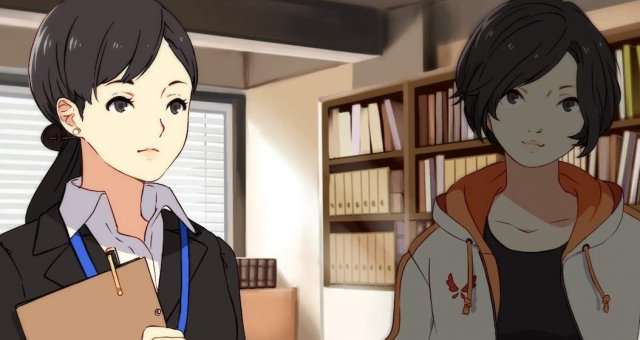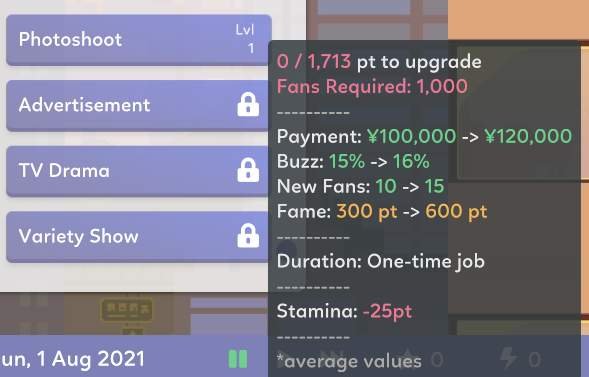
Is your agency bleeding money? Are you constantly going bankrupt without understand how you’re supposed to avoid it? Follow these basic fundamental tips.
Tips on How to Not Go Bankrupt
The TL;DR
For those who just want the short version of this guide, here it is the 4 simple steps for not going bankrupt in the early game:
- Build a break room ASAP (and build a second break room after you have more than 5 idols).
- After building a break room, always do a daily activity: “Promotion” by default, “Performance” if you are running low on money, “Spa” if your idols are low on stamina (<30%).
- Turn off auto-practice and don’t send idols to dancing or vocal training unless they have full stamina.
- Hire a second sales manager. Set one of your sales managers to “auto-proposal” with with photoshoot as her preferred business deal type, and always accept photoshoot business proposals. Have your other sales manager rotate between generating research points, working on production tasks, and photoshoot business proposals when she isn’t doing anything else.
As you continue to play:
- Fujimoto gives interest-free loans, which you should use extensively (If you take the “time value” of money into account, Fujimoto’s loans are essentially free money!).
- If you are creating too many business proposals for your idols to keep up (they keep running low on stamina), hire more idols. If all of your idols are constantly at max stamina, hire another sales manager (and set them to “auto-proposal” with focus on photoshoots.
- Keep an eye on idol salary. The “satisfaction cap” is 200%, which means that if someone is 200% satisfied with their salary, you can probably pay them less with no negative consequences.
- That being said, idol salaries are not one of your bigger expenses compared to things like rent and staffer salaries, so don’t be shy about recruiting more idols if you have ways to put them to work (Just remember: for every 5 idols you recruit, add a break room!).
- Don’t give up, even if you’re deep in debt. If you’re playing on the default difficulty (or easy), there are several unique story events (some of which are specifically triggered by having a dire financial situation), and some of them provide extra income that can help you survive longer than you might think (Plus, there’s a unique ending for going bankrupt, which goes way beyond just a simple “game over” screen! It unlocks a unique achievement and is needed for 100% CG gallery completion.).
Following all of the above will help you maintain positive cash flow in the early game while you work on building out the other parts of your agency. (As you do this, your best long-term investments are activities that increase fans.) Once you begin making money from singles and concerts, you will start to have more leeway/freedom/flexibility.
Beyond the TL;DR
The rest of this guide is on the long side, but aims to explain all of the game’s mechanics to explain why we are doing all of the above.
This is important and recommended reading, because once you understand why these are good strategies for the early game, you will understand when these early game tips are no longer necessarily or valid, which will ease your transition into the mid-game and beyond as you start to doing other types of activities and business deals.
The Two Resources You Have to Manage
Surviving Idol Manager’s early game is about managing two resources: money and idol stamina.
If you only take one thing away from this guide, it should be this: Idol stamina is a resource that should be treated as valuable as money.
Almost every one of the “new player traps” that causes inexperienced players to go bankrupt comes down to wasting idol stamina without thinking about it.
Stop wasting idol stamina. Treat it as a precious, because idol stamina is money.
In managing these two resources, realize:
- You can convert Idol Stamina to money by having them do business deals.
- You can convert money into idol stamina by holding an audition and hiring more idols.
In the following sections, there are more details about the best ways to keep idol stamina high — this may not seem like it’s directly related to your bank account, but as we’ll see, idol stamina is the easest and fastest way to get money — and spending your idols’ stamina wisely is the key to keeping your finances healthy.
Idol Stamina: How to Spend It, and How to Get It Back
Keeping idol stamina high
The single most important tip I can give: Invest in a break room.
For an explanation of why, we only need read the break room’s in-game description:

That is 25 points of idol stamina per day! Even if you only have 3 idols per day, that’s 15 points of stamina per day! For free!
Okay, technically it’s not free, since you’re paying for rent on any room you build, but compare the 5 pts of stamina each idol recovers from a break room to the “Spa treatment daily activity”, which requires you to spend money to recover stamina. The break room is a bigger up-front expense, but it is something that will benefit you for the entire rest of the game and is completely passive!
Even better, consider this: the daily activities for “performance” and “promotion” each spend 3 pt of stamina. The break room passively recovers 5 pt of stamina per day. That means, if you have a break room, you can spam the performance or promotion activity every day and still be net positive on stamina!
Note: Each break room recoverst stamina for 5 idols. As your group expands, make sure to keep building additional break rooms so that the new idols have a place to hang out and recover stamina, too!
Build a break room ASAP. Take out a loan if you have to. It is one of the most important investments you will make.
The new-player trap: turn off auto-coaching
Again, it bears repeating: the key to avoiding bankruptcy in the early game is to stop wasting idol stamina!
Are your coaches spending every spare moment on training idols? Are you immediately dragging your idol into the dance room or recording studio for a coaching session every time the dance room comes off cooldown? Stop!
In fact, training idols is one of the worst things to do with idol stamina. Every point of stamina that an idol spends on training is a point of stamina that she can’t spend on other things, like:
- Business deals (the most lucrative use of idol stamina).
- Promotion daily activity (which increases your fanbase, which directly improves the number of sales you get from singles).
- Performance daily activity (which automatically puts money in your pocket).
I hear you saying: “But if I don’t train my idols, my concert performances will be worse!” Well, if you’re going bankrupt in the early game, you probably haven’t yet reached the point in the game where you’re doing concerts. Work on surviving the early game first.
But you might then say: “If I don’t train my idols, my singles will be worse!” And you would be wrong, because here’s the other reason that you should not spam dance practice and vocal practice in the early game: It doesn’t just spend idol stamina, it also spends the coach’s time, too! Every moment that a dance or vocal staffer spends training an idol is a time that they’re not passively generating research points. Research points allow you to upgrade your group’s levels for musical genres and dance styles, which will improve your singles. And these upgrades will persist for the entire game, unlike individual idols (which, over the course of the game, have the potential to graduate and get replaced with other idols).
In short, if you want to “improve your stats” and “invest in the future of your group,” the best thing you can do is NOT go to dance practice: instead, have the dance instructor generate research points, and have the idol spend her stamina on more important activities that actually generate revenue for your group.
Again, I don’t mean to sound like a broken record, but dance practice and vocal practice are a new player trap. Turn off auto-practice. Stop spamming them just because the game lets you.
So, what should I spend stamina on?
Each of the following will have their own section, but to give you a quick over-view of your priorities:
The single highest return-on-investment is business deals (No surprise there.). You should basically say “yes” to every business deal that comes along. If you ever find yourself unable to accept a business deal due to all of your idols being out of stamina, you should either find ways to recover stamina (spa), or hire more idols.
For daily activities, you should be doing either Performance or Promotion every day (As mentioned before, your passive stamina recovery from building a Break Room exceeds the stamina spent from doing daily activities.).
Generally speaking, it is better for your daily activity to be Promotion — Promotion gains fans, which is a permanent boost to your group’s future revenue, since it boosts sales on all future singles (and, eventually, revenue from concerts and the theater). However, if you are at risk of going bankrupt, obviously you should be doing Performance to keep yourself from going under.
Business Deals
What type of business deals are best to focus on?
This guide is all about money, which is one of the most important early game resources. That means we’re going to mostly focus on Photoshoot and Advertisement (which, as the game’s “policy” dialog tells you, are the ones that translate most into making money).
There’s another reason that we don’t want to do TV dramas: it raises idols fame levels (in exchange for generating less money). This is generally a good thing…but as idols become more famous, they expect a higher salary to keep their satisfaction high.
So, between, Photoshoot and Advertisement, which do we focus on? Let’s compare both of them at level 1:
Photoshoot
- Yen 100,000
- New fans: 10
- Fame: 300
- Stamina: -25
Money efficiency (yen earned per point of stamina spent): 4000
Advertisement
- Yen 20,000 per week (240,000 total)
- New fans: 0
- Fame: 250 per week (3000 total)
- Stamina: -10 per week (-120 total)
Money efficiency (yen earned per point of stamina spent): 2000
Several important takeaways:
- If the only thing we care about is converting idol stamina into money, then photoshoots are twice as effective as advertisements.
- Furthermore, advertisements come with liability: if an idol becomes involved with a scandal, the contract will end, and you will pay a large penalty greater than the money you would have earned.
- So, focusing 100% on photoshoots is generally the way to go.
That Being Said, there are several reasons to consider advertisement contracts:
- First off, Ads are a much more efficient use of your staffer’s time (x2.4 more efficient in terms of staffer time). If you are repeatedly doing photoshoots, it means the staffer constantly has to generate new business deals, whereas if you do an ad deal, it becomes a recurring revenue source that frees your staffer up to do other things.
- Second, if you care about things beyond money, ads generate vastly more fame for the idol who is involved. (Though, as mentioned earlier, idols’ salary expectations become higher as their fame level rises — so this is not necessarily a good thing.
Tip: Consider investing in a second sales manager
The game’s tutorial has a section that gives general economic advice like “pay attention to profit centers and cost centers.”
The game doesn’t spell this out in the tutorial, so I will: the business manager’s office is a profit center. Do not balk at spending more money to expand this part of your business by hiring a second one, because if used well, your sales manager will generate far more revenue for your agency than she costs in salary (and rent for her office).
Here’s some ideas for how to use a second staffer:
- Generate twice as many business deals (when you have the available stamina), effectively doubling your business deal income.
- When you need a staffer to do business production tasks (like coming up with a marketing plan for a single), you can have the other staffer continue working on business deals.
- You can have one staffer work on business deals to generate revenue, while the other generates research points to upgrade your business plans.
This is especially true because the business manager’s office is a “Small” room (only takes up 1 space), compared to the dance room and recording studio and break room (which each take up 2 spaces), which means that they cost less in rent, and are easier to fit into your agency.
In fact, a second office fits very early into your starting player agency building. If you followed the tutorial, and then followed this guide and built a break room, your agency should look something like this:
Notice something? Yeah, we’ve got two extra empty spots (in this screenshot, they’re the spots on the far right.) This means you can build an extra office to hire another business manager without having to expand and occupy a 3rd floor (which increases your rent costs.) As for that other extra slot…maybe spend it on a third sales manager (or, if you feel like it, you could use that space to build a salon and hire stylist so you can customize your idols’ appearance).
Tip: Upgrade your business deals!
Once you’ve gotten your basic economy running, consider upgrading your group’s “business deals” stat for whichever type of business deal you are doing most often.
Let’s look at the game UI and compare the difference between a level 1 photoshoot and a level 2 photoshoot:

The important part: there’s a 20% increase in revenue, from 100,000 yen to 120,000 yen (20,000 yen difference). And remember, that’s the base rate, before any multipliers are applied: If you have a high-tier idol who is getting a getting a x1.3 multiplier then it becomes a difference of 26,000 yen! Considering how many business deals you’re going to do over the course of the game, that’s going to add up very quickly.
Plus, it’s also gaining 50% more fans — which you will convert into future revenue by having more customers who buy your group’s singles (and concert tickets, and theater tickets, and so on).
The most important part is that these apply to business deals made by ALL of your sales managers — which means that if you have 2 sales managers, that’s 2 staffers that are benefitting from the research upgrade. This is another reason to invest in multiple managers: not only will it let you buy the upgrade faster (by having an extra staffer to generate research points), but it will multiply the benefits of having the research upgrade.
Idol Salaries
As stated at the start of this post, the highest an idol’s satisfaction level will ever go is 200%. If her satisfaction level is at 200%, it probably means you are over-paying her, and you can go and reduce her salary without any negative consequences.
The “1 yen exploit”
A note about the game’s UI:
On the “salary” screen, there are + and – buttons next to each idol’s satisfaction level that you can use to increase or decrease the idol’s salary by preset amounts. Doing this will allow you to reduce their salary to around 40% of their salary’s starting level.
However, if you click the write/pen icon next to their salary, you can type in ANY number — including 1. Yes, you can pay your idols a weekly salary of 1 yen.
There are several reasons I’m mentioning this closer to the end of the guide, rather than leading with it:
- First off, while it’s technically not a bug, it feels like an exploit, and seems like the kind of thing that might get changed in a future patch.
- Second, idol salaries are actually one of the smaller expenses in the game compared to things like rent and staffer salaries, and setting every idol’s salary to 1 yen will not magically solve your financial problems (As the game’s tutorial says, this game is all about managing profit centers, not cost centers.). If you follow the rest of this guide, you will easy avoid bankruptcy far better than if you just set everyone’s salary to 1 yen.
And lastly, most people who claim this has “no negative consequences” are, IMO, under-estimating the importance of idol satisfaction. Yes, it’s true that idols will not quit right away just because they’re unhappy. However, according to dev’s notes, it will accelerate their graduation date. This means an idol who might have stayed with the group for 6 years might instead graduate after 3 years. You probably wouldn’t notice this in the short term, but in the long term, you will be losing a huge amount of the time and resources that you invest in your idols if they’re unhappy with the group and graduating sooner as a result.
Transitioning to Mid-Game
And now, we reach the conclusion:
To summarize the intent of this guide, the advice given above is all intended to help new players avoid bankruptcy in the early game.
The strategy outlined in this guide is not the ideal way to make money as you move into the mid and late game. Rather, they are survival strategies for the early game before you’ve unlocked the bigger money-making events and had the chance to develop a fanbase.
Once you’ve reached positive cash flow and are no longer at risk of going bankrupt, you can move forward and progress at your own pace. Detailed mid to late game advice goes beyond the scope of this guide.
That being said, here are a few simple tips to help you transition your early-game economy as you grow:
- Releasing singles is not the best source of money in the early game, as they scale based on the size of your fanbase (which, when you’re starting out, is tiny). However, you still want to rush and get 5 singles out ASAP because doing this unlocks concerts, which are a huge money-maker.
- Similarly, cafe and theater great and reliable sources of money (and unlike the concert, there’s no 3-month cooldown to use them). The stipulation is that taking full advantage of them requires having a bunch of idols available to work them — given their high rent cost, you don’t want them to just sit there doing nothing. Still, once your group is big enough, they will prove to be well-worth the investment.
- “Developing your group” mostly comes down to getting more fans, as most of the late-game activities scale off the number of fans you have.
To add to the last point, the “Promotion” daily activity is one of the easiest sources of new fans, you should be aiming to upgrade this as you play. The scaling on the daily activities is crazy. Consider:
- Level 1 promotion: +7 fans
- Level 2 promotion: +35 fans
- Level 3 promotion: +140 fans
- …
- Level 10 promotion: +5000 fans
That the amount gained per day. Every single one of these milestones is a huge deal, and the upgrade requirements for each of them should be the main thing that guides you as you develop your group in Idol Manager.
Or…don’t. Like I said, once you’ve hit positive cash flow and are no longer bleeding money every month, you you have more freedom and flexibility to move through the game at your own pace.






Be the first to comment